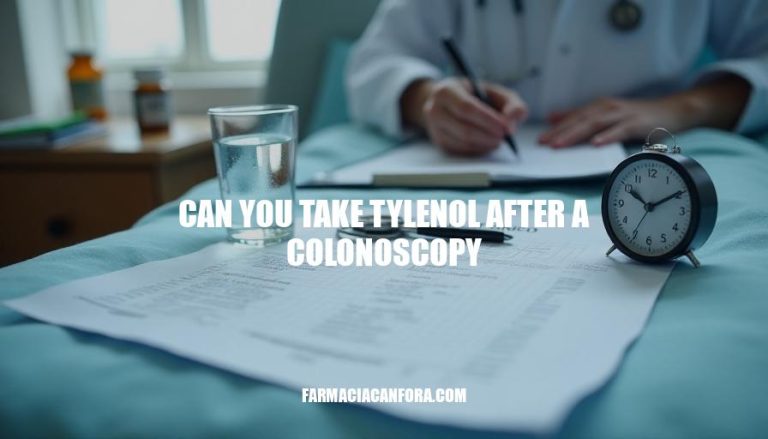


A colonoscopy can leave you feeling uncomfortable, bloated, or even in pain. This is normal because of the bowel prep, sedation, and exam itself.
You might be wondering how to manage this discomfort. One concern is taking pain meds like Tylenol.
Is it safe to take Tylenol after a colonoscopy?
Tylenol (acetaminophen) is generally considered safe for pain relief after a colonoscopy. Healthcare providers often recommend it as an alternative to nonsteroidal anti-inflammatory drugs (NSAIDs) like ibuprofen, which can irritate the stomach lining or increase the risk of bleeding. However, it is essential to follow specific guidelines to ensure its safe use:
Consultation with a Healthcare Provider: Always consult your doctor before taking Tylenol after a colonoscopy.
They can provide personalized advice based on your medical history, current medications, and any complications from the procedure.
Dosage Guidelines: Adhere strictly to the recommended dosage on the packaging or as prescribed by your doctor. Exceeding the maximum daily dose (usually 4,000 mg for adults) can lead to liver damage, especially if combined with alcohol or other medications that affect the liver.
Monitoring for Side Effects: Be vigilant for any signs of adverse reactions, such as nausea, vomiting, or unusual fatigue, which could indicate liver issues. If these symptoms occur, seek medical attention immediately.
Conditions Affecting Suitability: Tylenol may not be suitable for individuals with pre-existing liver conditions, chronic alcohol use, or allergies to acetaminophen.
In such cases, alternative pain relief methods, such as a heating pad or rest, may be recommended.
Interactions with Other Medications: If you are taking other medications, including over-the-counter drugs, check for potential interactions with Tylenol. Your healthcare provider can guide you on safe combinations.
Post-Procedure Symptoms: If pain persists or is accompanied by severe symptoms like heavy bleeding, fever, or abdominal swelling, contact your healthcare provider immediately, as these could indicate complications requiring medical intervention.
Following these precautions ensures the safe use of Tylenol for managing discomfort after a colonoscopy. Always prioritize professional medical advice tailored to your specific health needs.
Tylenol is generally considered safe for pain relief after a colonoscopy, but it’s essential to follow specific guidelines to ensure its safe use.
Consult your doctor before taking Tylenol, as they can provide personalized advice based on your medical history and current medications.
Adhere strictly to the recommended dosage, monitor for side effects such as nausea or unusual fatigue, and be aware of conditions that may affect suitability, including pre-existing liver conditions or chronic alcohol use.
Additionally, check for potential interactions with other medications and seek immediate medical attention if you experience severe symptoms like heavy bleeding, fever, or abdominal swelling.
By following these precautions, you can safely manage discomfort after a colonoscopy using Tylenol as directed by your healthcare provider.